 Moto Guzzi V85 TT - Owner's Manual > Stand
Moto Guzzi V85 TT - Owner's Manual > Stand
BEFORE SETTING OFF, MAKE SURE THE STAND HAS BEEN COMPLETELY RETRACTED TO ITS POSITION.
DO NOT REST THE RIDER OR PASSENGER WEIGHT ON THE SIDE STAND.
THE SIDE STAND MUST ROTATE FREELY. IF NECESSARY GREASE THE JOINT.
SIDE STAND
If the stand has been folded up for any manoeuvre (for example, when the vehicle is in motion), place the vehicle on the stand again as follows:
- Grasp the left grip and put the right hand on the upper rear part of the vehicle.
- Push the side stand with your right foot to fully extend the stand.
- Lean the vehicle until the stand touches the ground.
- Turn the handlebar fully leftwards.
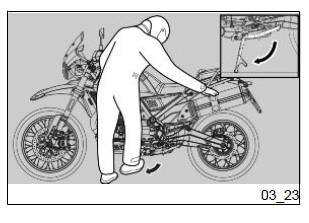
CAUTION
MAKE SURE THE VEHICLE IS STABLE.
A safety switch (2) is installed on the side stand (1) to inhibit ignition or to stop the engine when a gear is engaged and the side stand (1) is lowered.
CHECK THAT THE AREA AROUND THE SWITCH IS NOT DIRTY. CLEAN THE AREA IF NECESSARY AND CHECK ON THE INSTRUMENT PANEL THAT THE INDICATOR LIGHT COMES ON WHEN THE STAND IS LOWERED.
IF THE SIDE STAND INDICATOR LIGHT COMES NOT COME ON WHEN THE STAND IS LOWERED EVEN AFTER CLEANING, CONTACT AN Authorised Moto Guzzi Dealer.
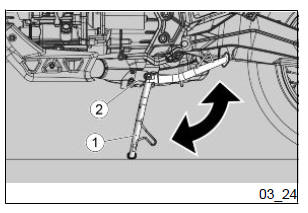
Suggestion to prevent theft
CAUTION
WHEN USING A DISC LOCKING DEVICE, PAY UTMOST ATTENTION TO REMOVE IT BEFORE RIDING. FAILURE TO OBSERVE THIS WARNING MAY CAUSE SERIOUS DAMAGE TO THE BRAKING SYSTEM AND ACCIDENTS WITH CONSEQUENT PHYSICAL INJURIES OR EVEN DEATH.
NEVER leave the ignition key in the lock and always use the steering lock. Park the vehicle in a safe place such as a garage or a place with guards. Whenever possible, use an additional anti-theft device. Make sure all vehicle documents are in order and the road tax paid. Write down your personal details and telephone number on this page to help identifying the owner in case of vehicle retrieval after a theft.

WARNING
IN MANY CASES, STOLEN VEHICLES CAN BE IDENTIFIED BY DATA IN THE USE / MAINTENANCE BOOKLET.
Safe driving
Some simple tips are provided below that will enable you to use your motorcycle on a daily basis in greater safety and peace of mind. Your mechanical knowledge and ability are the foundation for safe driving. We recommend trying out the motorcycle in traffic-free zones to familiarise with it.
1. Before riding off, remember to put the helmet on and fasten it correctly.
2. Slow down and drive carefully over bumpy roads.
3. After driving over a long stretch of wet road without using the brakes, braking will not be as efficient the first time/s you use them again. When driving under conditions like this, you should brake periodically.
4. Although the vehicle is equipped with an ABS system, pay attention when braking on wet surfaces, on dirt or on a slippery road surface.
5. Avoid riding off by mounting the scooter when it is resting on its support.
6. When riding on roads covered with sand, mud, snow mixed with salt, etc. We recommend cleaning the brake discs frequently with a non-corrosive detergent in order to prevent corrosive particles from building up in the holes, which may cause early brake pad wear.
CAUTION
TO ALLOW THE QUICK REACHING OF THE PERFECT GRIP OF NEW TYRES AT THE FIRST MILEAGE, IT IS RECOMMENDED A PARTICULARLY CAREFUL GUIDE OF THE MOTORCYCLE, AVOIDING SUDDEN STEERING OR VIOLENT ACCELERATION AND BRAKING.
CAUTION
ALWAYS RIDE WITHIN YOUR LIMITS. RIDING UNDER THE INFLUENCE OF ALCOHOL OR OTHER DRUGS AND CERTAIN MEDICINES IS EXTREMELY DANGEROUS.
CAUTION
ANY ELABORATION THAT MODIFIES THE VEHICLE'S PERFORMANCES, SUCH AS TAMPERING WITH ORIGINAL STRUCTURAL PARTS IS STRICTLY FORBIDDEN BY LAW, AND RENDERS THE MOTORCYCLE NO LONGER CONFORMING TO THE APPROVED TYPE AND DANGEROUS FOR RIDING.
CAUTION
DO NOT ADJUST THE MIRRORS WHILE DRIVING. THIS COULD CAUSE YOU TO LOOSE CONTROL OF THE MOTORCYCLE.
CAUTION
STOP THE VEHICLE MAINLY USING THE FRONT BRAKE. THE REAR BRAKE MUST ONLY BE USED TO BALANCE THE BRAKING EFFECT, AND ONLY TOGETHER WITH THE FRONT BRAKE.
Basic safety rules
The following recommendations should receive your maximum attention, because they are provided to increase your safety, and decrease damage to people, things and vehicles, in the case of a fall of the rider or passenger from the vehicle and/or from the fall or overturning of the vehicle.
Mounting and dismounting the vehicle should always be performed with total freedom of movement and with the hands free of all objects. (i.e.- objects, helmet, gloves, or glasses).
Mount and dismount only on the left side of the vehicle, and only with the side stand lowered.
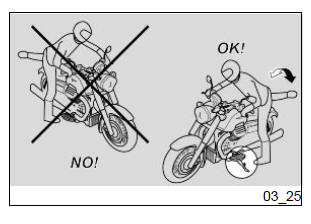
The stand is designed to support the weight of the vehicle and a small additional weight, which does not include the rider and passenger.
Mounting into driving position, with the side stand in place, is permitted only to prevent the possibility of the vehicle falling or overturn, and does not indicate the possibility for the rider and passenger's weight to be placed on the side stand.
During mounting and dismounting the vehicle's weight can cause a loss of balance, with consequent loss of equilibrium and the possibility of falling or overturning.
CAUTION
THE RIDER SHOULD ALWAYS BE THE FIRST TO MOUNT AND THE LAST TO DISMOUNT FROM THE VEHICLE, AND SHOULD CONTROL THE STABILITY AND EQUILIBRIUM OF THE VEHICLE WHILE THE PASSENGER IS MOUNTING AND DISMOUNTING
In any case, the passenger should mount and dismount the vehicle using caution to avoid causing the vehicle or the rider to lose balance.
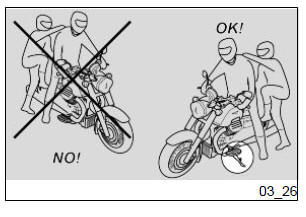
CAUTION
THE RIDER TO INSTRUCT THE PASSENGER ABOUT THE PROPER WAY TO MOUNT AND DISMOUNT FROM THE VEHICLE.
THE VEHICLE INCLUDES PASSENGER FOOTRESTS WHICH SHOULD BE USED DURING MOUNTING AND DISMOUNTING. THE PASSENGER SHOULD ALWAYS USE THE LEFT FOOTREST FOR MOUNTING AND DISMOUNTING FROM THE VEHICLE.
DO NOT DISMOUNT OR EVEN ATTEMPT TO DISMOUNT BY JUMPING OR STRETCHING OUT YOUR LEG IN ORDER TO TOUCH THE GROUND. IN BOTH CASES THE STABILITY AND EQUILIBRIUM OF THE VEHICLE COULD BE COMPROMISED.
CAUTION
BAGGAGE OR OBJECTS ATTACHED TO THE REAR PART OF THE VEHICLE CAN CREATE AN OBSTACLE DURING MOUNTING AND DISMOUNTING FROM THE VEHICLE.
IN ALL CASES, THINK AHEAD AND MOVE YOUR RIGHT LEG CAREFULLY, AS IT WILL HAVE TO AVOID AND CLEAR THE REAR PART OF THE VEHICLE (INCLUDING BAGGAGE AND THE TAIL FAIRING) WITHOUT CAUSING LOSS OF BALANCE.
MOUNTING
- Grip the handlebar properly and mount the vehicle without placing your weight upon the side stand.
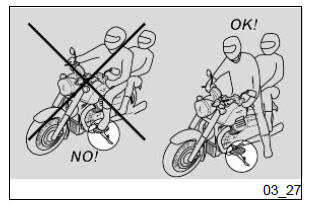
CAUTION
IN THE CASE THAT YOU ARE NOT ABLE TO REST BOTH FEET ON THE GROUND, PUT THE RIGHT FOOT ON THE GROUND, (IN THE CASE OF A LOSS OF BALANCE THE LEFT SIDE IS "PROTECTED" BY THE SIDE STAND) AND KEEP YOUR LEFT FOOT READY TO BE POSITIONED.
- Place both feet on the ground and straighten the vehicle into the driving position, always maintaining its equilibrium.
CAUTION
THE RIDER SHOULD NOT OPEN OR TRY TO OPEN THE PASSENGER FOOTRESTS FROM THE RIDER'S SEAT, AS IT COULD COMPROMISE THE STABILITY AND EQUILIBRIUM OF THE VEHICLE.
- Have the passenger open the two passenger foot pegs.
- Show the passenger how to mount the vehicle.
- Use your left foot to push on the side stand and make it fully return to its position.
DISMOUNTING
- Select an appropriate parking spot.
- Stop the vehicle.
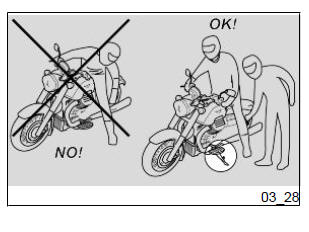
MAKE SURE THAT THE GROUND ON WHICH THE MOTORCYCLE IS PARKED IS FIRM, EVEN AND FREE OF OBSTACLES.
- Use the heel of your left foot to completely open the side stand.
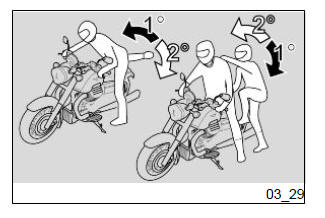
CAUTION
IN THE CASE THAT YOU ARE NOT ABLE TO REST BOTH FEET ON THE GROUND, PUT THE RIGHT FOOT ON THE GROUND, (IN THE CASE OF A LOSS OF BALANCE THE LEFT SIDE IS "PROTECTED" BY THE SIDE STAND) AND KEEP YOUR LEFT FOOT READY TO BE POSITIONED.
- Place both feet on the ground and keep the vehicle balanced in the driving position.
- Show the passenger how to dismount from the vehicle.
RISK OF FALLING OR OVERTURNING.
MAKE SURE THAT THE PASSENGER HAS DISMOUNTED FROM THE VEHICLE.
DO NOT PLACE YOUR WEIGHT UPON THE SIDE STAND.
- Lean the motorcycle until the stand touches the ground.
- Correctly grip the handlebar, and dismount from the vehicle.
- Turn the handlebar completely to the left.
- Place the passenger footrest in its place.
CAUTION
MAKE SURE THE VEHICLE IS STABLE.
See also:
 Moto Guzzi V85 TT - Owner's Manual > Moving off / riding
Moto Guzzi V85 TT - Owner's Manual > Moving off / riding
CAUTION THE ECU INSTALLED ON THIS MOTORCYCLE COMPENSATES FOR INCREASED ELECTRIC POWER CONSUMPTION BY TEMPORARILY RAISING THE IDLE SPEED; VARIATIONS IN ENGINE SPEED WITHIN THIS RANGE ARE THEREFORE NORMAL.
 Ducati Scrambler
Ducati Scrambler Fantic Caballero 500
Fantic Caballero 500 Indian FTR 1200
Indian FTR 1200 Moto Guzzi V85 TT
Moto Guzzi V85 TT Royal Enfield Bullet Trials Works Replica
Royal Enfield Bullet Trials Works Replica Triumph Scrambler 1200 XE
Triumph Scrambler 1200 XE Triumph Street Scrambler
Triumph Street Scrambler Yamaha XSR700
Yamaha XSR700 Ducati Scrambler 800
Ducati Scrambler 800 Moto Guzzi V85 TT
Moto Guzzi V85 TT Triumph Scrambler 1200 XC
Triumph Scrambler 1200 XC